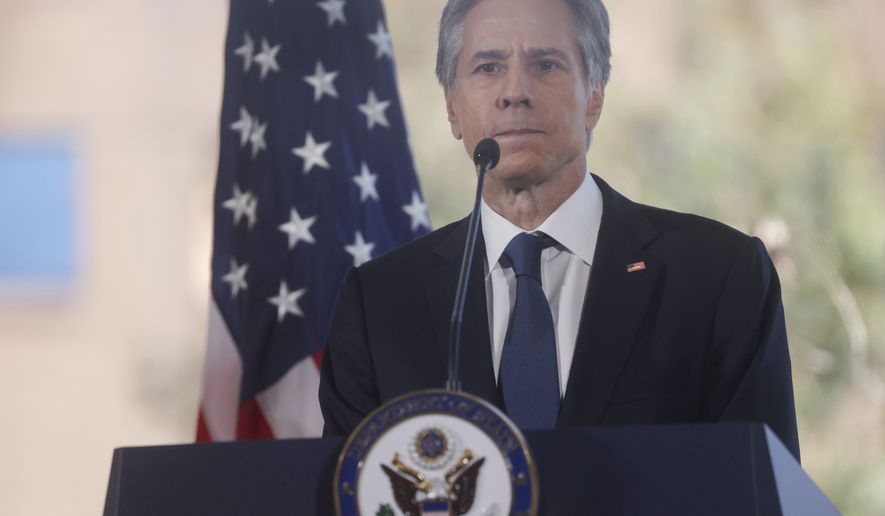Former Albanian Prime Minister Sali Berisha said that a Paris judge has accepted his defamation lawsuit against Secretary of State Antony Blinken.
Mr. Berisha filed the case in May after Mr. Blinken sanctioned the former leader for “significant corruption” and declared him and members of his family persona non grata in the U.S.
He said Mr. Blinken’s claims of “significant corruption” were baseless and “rendered without any evidence, fact, or document” that would support the decision to levy sanctions.
“That decision … came eight years after I resigned from any leadership position and every public executive function and three weeks after the candidate I supported lost the election,” Mr. Berisha told The Washington Times.
“In addition, during 30 years of my career, I have never been charged or investigated for any form of corruption. No one has ever filed a lawsuit or proven any allegations of corruption in a court of law against me or my family members,” he added.
In a statement announcing the sanctions, Mr. Blinken alleged that Mr. Berisha “was involved in corrupt acts, such as misappropriation of public funds and interfering with public processes, including using his power for his own benefit and to enrich his political allies and his family members” while prime minister from 2005-2013.
Mr. Blinken further charged that Mr. Berisha’s “own rhetoric demonstrates” that he would avoid independent investigations into corruption against him or his family members.
But the sanctions caught some in Washington off guard.
In a June hearing, Rep. Lee Zeldin, New York Republican and member of the House Foreign Affairs Committee, grilled Mr. Blinken for an explanation of why the State Department had not yet produced evidence to back up its corruption allegations against Mr. Berisha.
“For many, this seemingly came out of nowhere,” Mr. Zeldin said about the decision to sanction Mr. Berisha.
Mr. Blinken defended the action but stopped short of offering evidence to back up the allegation against Mr. Berisha, who has made international headlines by claiming the secretary of state’s move against him was based on “misinformation” from outfits backed by billionaire liberal activist George Soros.
Representatives of Mr. Soros did not immediately respond to The Times’ request for comment and have not responded to previous requests concerning Mr. Berisha’s claims.
Mr. Blinken also testified in June that the corruption allegation had followed normal State Department protocols, including a review by counsel.
“I don’t have anything [beyond that] to share right now,” he said. “But I’d be happy to come and make sure that we share that with you and anyone else who’s interested.”
One former high-ranking U.S. official, who spoke on condition of anonymity, pushed back against the secretary of state’s testimony in June and said the allegation came as a surprise to many in the State Department’s Bureau of European and Eurasian Affairs.
The State Department stood by the move in a statement to The Times on Friday saying the move was underpinned by “credible information regarding Berisha’s involvement in significant corruption and efforts to interfere with public processes and misappropriate public funds in Albania.”
“By this action, the United States government is making it clear that we will not engage with, and therefore lend credibility and support to, the likes of corrupt individuals like Berisha, an individual the Secretary of State has determined has committed corrupt acts at the expense of the Albanian people,” a State Department spokesperson said.
“The designation of Sali Berisha underscores that the United States stands with all Albanians working to promote accountability and transparency in their democratic institution,” the spokesperson continued and clarified that they are required by law to apply the designation to Mr. Berisha’s immediate family members.
Mr. Berisha said he looks forward to presenting his case in a French court and expressed “confidence in the court of law.”
“I invite the secretary of state to present to the court any evidence, fact, or document to prove the allegations on which he has based his groundless decision to declare me non grata,” he said.
• Joseph Clark can be reached at jclark@washingtontimes.com.
• Guy Taylor can be reached at gtaylor@washingtontimes.com.




Please read our comment policy before commenting.